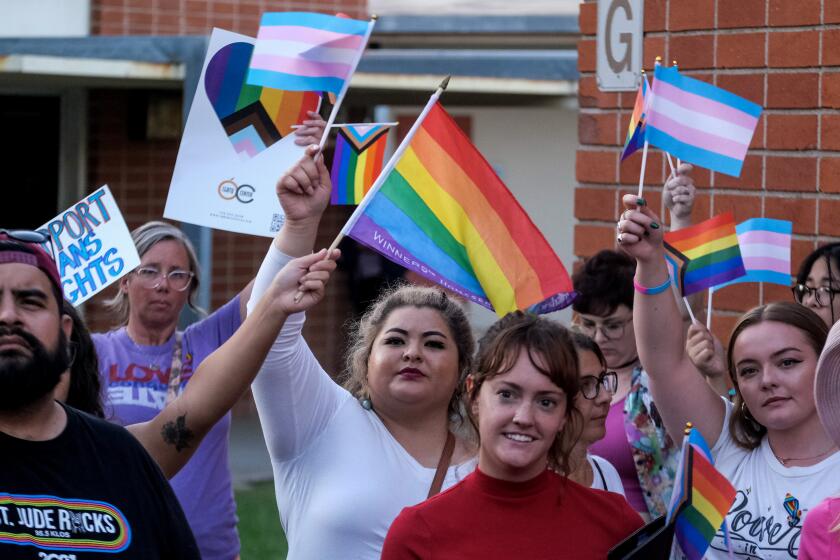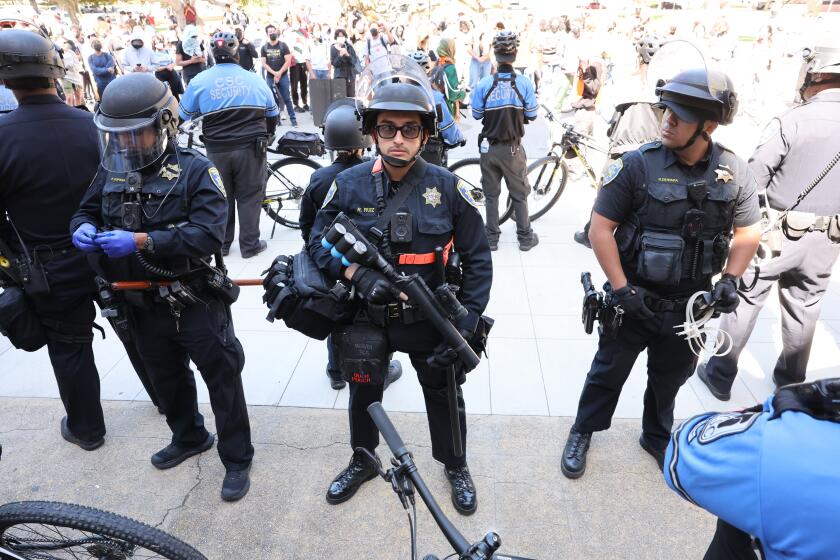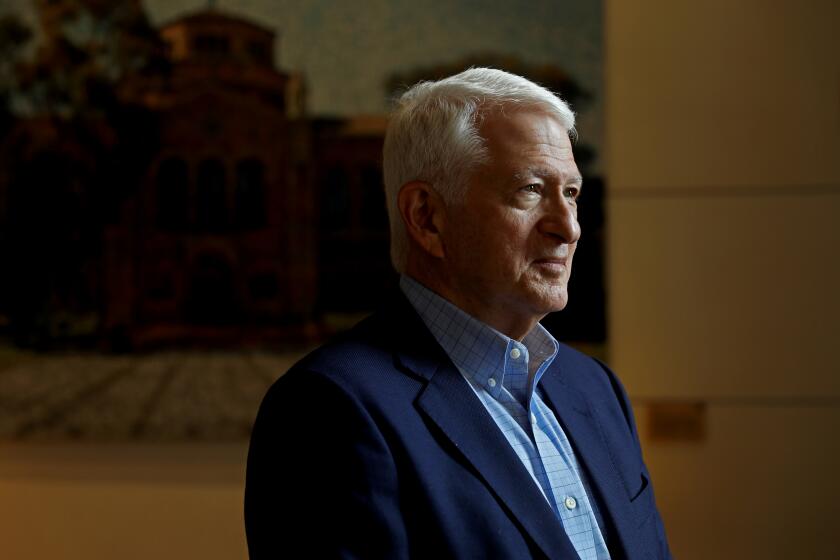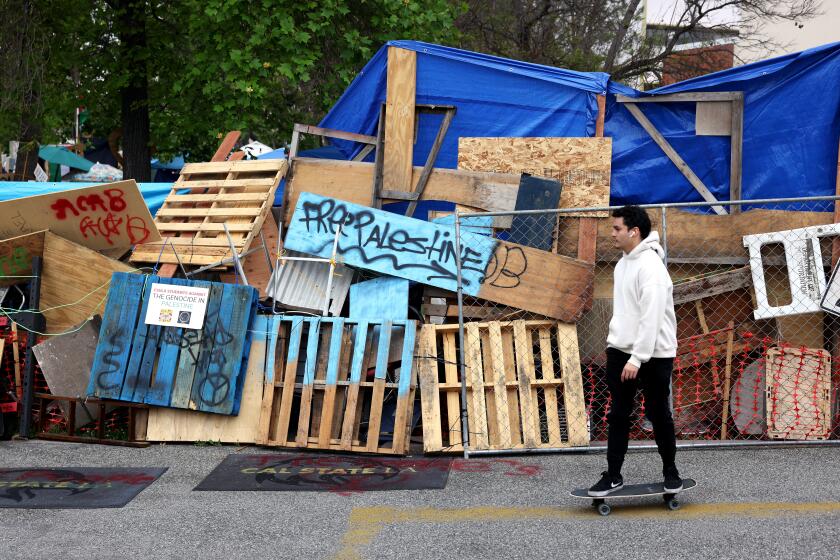Chink in mayor’s armor
For months, Los Angeles Mayor Antonio Villaraigosa ran circles around the hapless leaders of the Los Angeles Unified School District.
They tried to argue that schools were improving; he countered that modest progress was not enough, that they were “failing” children. They schlepped to Sacramento to testify before indifferent legislative panels; he swept into the Capitol, his old home turf, escorted by his close friend, Assembly Speaker Fabian Nunez. They tried to enlist teachers unions on their side; Villaraigosa cut his own deal with labor and left the school board isolated.
But Villaraigosa’s campaign for school takeover hit the wall Thursday, when Superior Court Judge Dzintra Janavs rejected it wholesale, tossing the centerpiece of the mayor’s first year in office brusquely aside. Janavs not only concluded that the proposal was unconstitutional, she went so far as to adopt many of the school district’s characterizations of the bill and of the district’s progress in recent years.
“While the LAUSD faces numerous demographic challenges, LAUSD’s test scores have risen in recent years at a rate of 150% of the state average, and LAUSD is fourth in the state in the percentage of schools that met or exceeded their Academic Performance index ... ,” Janavs wrote, language utterly superfluous to her ruling but implicitly chastising of Villaraigosa’s efforts.
Now, with those denunciations ringing in the mayor’s ears, the campaign moves precisely into the arena where Villaraigosa has the least control and where his greatest strengths-- charm and energy -- are of no use to him.
In his first comments about the ruling, Villaraigosa did not appear to recognize how fundamentally the debate has shifted. Villaraigosa defended the constitutionality of his proposal, but concluded by arguing: “More than that, I believe we have the people on our side.”
But popular will -- and Villaraigosa’s ability to marshal it -- have receded in relevance as his pitch for at least partial mayoral control faces judicial review, not popular vote or legislative action. There, its prospects are far less certain, and neither Villaraigosa’s formidable poll numbers, his exuberant personality nor his legislative contacts are of much use.
As a result, school reform, once at the top of the mayor’s agenda, now threatens to slip away.
Not everyone sees that as a terrible development for the mayor, at least in political terms. Duke University law professor and longtime Villaraigosa friend Erwin Chemerinsky, for one, notes that Villaraigosa may well prevail on appeal. And even if the mayor loses this battle, Chemerinsky added, he can credibly say to voters that he did all he could, only to be blocked by the courts.
Richard Alatorre, a former L.A. councilman and shrewd observer of city politics, agrees.
“In political terms, he can turn around and say: I did the best I could,’ ” Alatorre said Friday. “In the long run, I think the mayor wins.”
That only protects the mayor’s flank, however. It does not serve children or raise educational standards in some new way.
Because of that, Alatorre said he does not believe that Villaraigosa will fold, at least not easily. “It’s a setback for him, but that’s not going to deter him,” the former councilman said. “He’s just begun to fight.”
Still, one clear casualty of this debate is the notion of Villaraigosa’s invincibility. He has used that to great effect in the past year -- sweeping past council members leery of his proposal to raise trash fees for hiring more police, chasing off contenders for City Council seats who fear taking on his friends, forcing the council to overturn its own support for a $2.7-million settlement to a former firefighter in a harassment case, even pushing school board member David Tokofsky out of the race for his own seat on the school board.
As of this week, that diminishment alone tilts the meter of Los Angeles politics.
“I think he went overboard in trying to avoid a vote of the people,” said Allen Hoffenblum, a Republican political analyst. “I know a lot of people who agree with that judge.”
Gary Toebben, president and chief executive of the Los Angeles Area Chamber of Commerce, sided with Villaraigosa on the school bill and acknowledged that this week’s events represented a rare public drubbing for the mayor. But Toebben argued that Villaraigosa’s willingness to take on the issue was more important than this ruling.
“In the private sector, we understand that you don’t win them all,” Toebben said. “In the public sector, you’re expected to win them all.” But that, he added, discourages public officials from tackling difficult tasks.
“We applaud the mayor,” he said, “for taking risks.”
There is, too, the question of what happens next outside the courts. And there Villaraigosa continues to hold some strong cards, for while the school debate now is principally being hashed out in court, it has not slipped the bounds of politics completely.
Villaraigosa is backing candidates for the school board in the spring elections, and the lawsuit may, oddly, bolster his hand there, as he can appeal to parents unsatisfied with the status quo and unhappy that the school district is blocking his efforts.
That supplies him with an issue and an electorate -- and thus potentially moves the matter back into the realm of politics, Villaraigosa’s home court. On Friday, even as they dusted off from Janavs’ ruling, aides to Villaraigosa savored that prospect.
“I think there’s no question that the judge’s ruling clarifies the picture for voters,” said Deputy Mayor Sean Clegg. “You have one side saying that the pace of change is acceptable.... And you have the other side, the mayor, fighting for fundamental change.”
More to Read
Start your day right
Sign up for Essential California for news, features and recommendations from the L.A. Times and beyond in your inbox six days a week.
You may occasionally receive promotional content from the Los Angeles Times.







